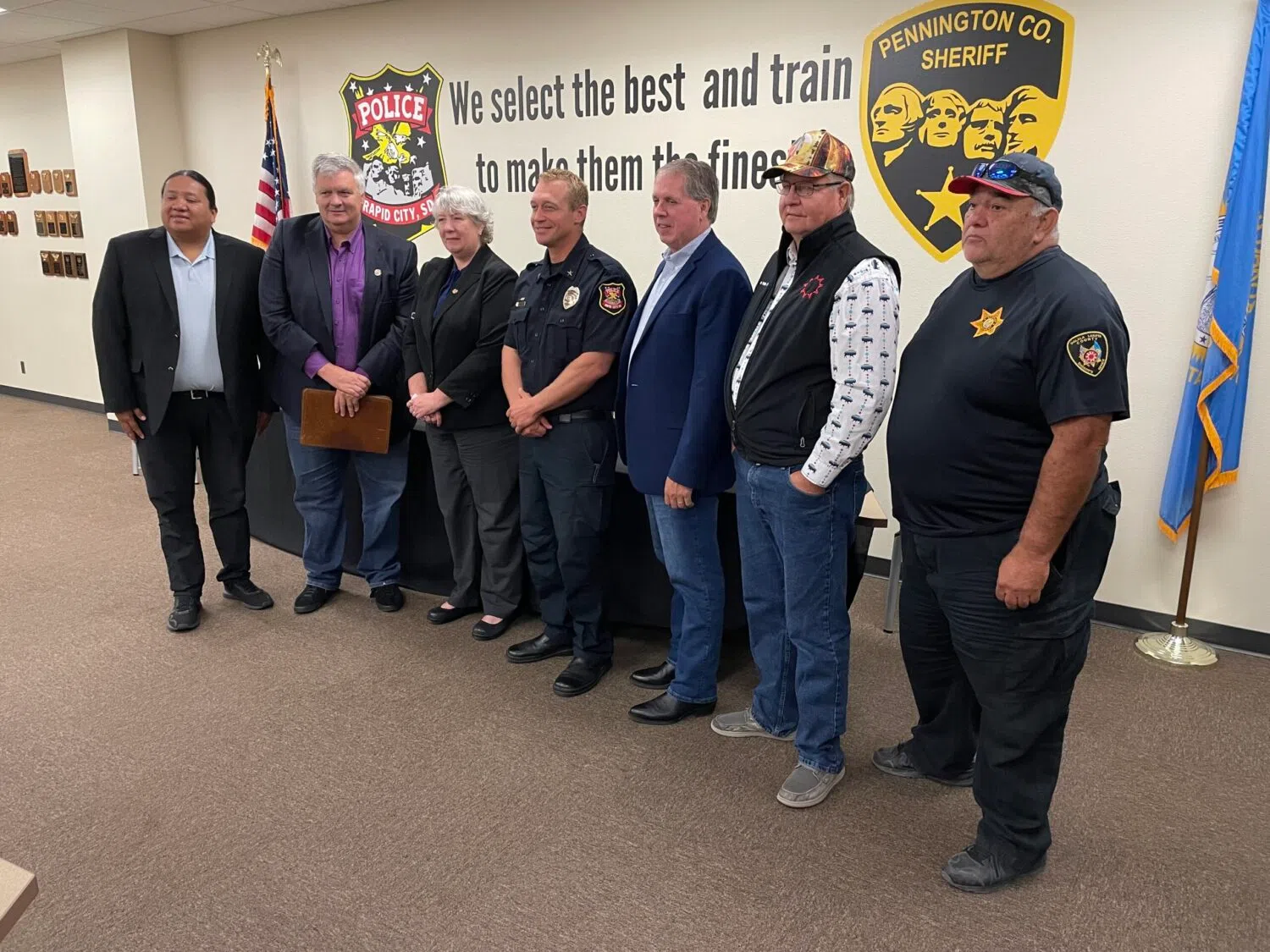
Law enforcement officials gather for the signing of a new mutual-aid agreement between Pennington County and the Oglala Sioux Tribe on Sept. 1, 2022. (Courtesy of SD Attorney General’s Office)
BY: JOHN HULT
PIERRE, S.D. (South Dakota Searchlight) – Gov. Kristi Noem and Attorney General Marty Jackley said Thursday they aim to open an extra basic law enforcement certification course for tribal police recruits this summer, but it’s unclear how many tribal recruits will be able to meet the course’s tight deadlines.
Tribes can use federal funding to operate their own law enforcement agencies under what are known as 638 agreements. Those local agencies, such as the Oglala Sioux Tribal Police, are separate from federal law enforcement officers certified to work for the Bureau of Indian Affairs.
BIA officers are required to attend a 13-week Indian Police Academy training in New Mexico — something tribal officials say hinders recruitment efforts. Last week, Sen. Mike Rounds, R-South Dakota, sent a letter to the Department of Interior urging the consideration of a tribal law enforcement academy for the Midwest.
Tribal-level officers can also be trained in New Mexico. However, they can and do attend basic law enforcement certification in Pierre alongside officers from state and local agencies all over South Dakota. After that basic training, non-BIA tribal officers are required to attend a two-week course in New Mexico.
The announcement from Republicans Noem and Jackley signals that the state will open an additional law enforcement training certification course this summer just for potential recruits from the six tribal law enforcement agencies that operate under 638 agreements.
“We already train tribal officers here in a limited fashion,” Jackley said, noting that typical training classes may include a few recruits from tribal agencies. “What’s being proposed now is a specialized, stand-alone class.”
Noem has spoken repeatedly about public safety on tribal reservations in recent months, starting with a joint speech to the Legislature in January when she alleged that Mexican drug cartels have infiltrated reservations. At a town hall last month in Winner, Noem alleged that some tribal leaders are “personally benefiting” from cartels.
Reacting to those and other comments, three tribal governments have since banned Noem from entering their reservations.
Noem said Thursday in a news release that tribal police departments need help.
“People in tribal communities continue to suffer because of the well-documented shortage of tribal law enforcement officers,” she said. “This hurts all of South Dakota’s nine reservations, so we are taking the lead on training more officers as quickly as possible.”
The summer course in Pierre could train between 40 and 48 officers, but it’s unclear how many officers will be able to give a notice of interest by April 19 and submit an application by May 1, the two deadlines listed in the Noem-Jackley letter sent to tribal officials.
Jackley said the course is possible because of support from the governor, but also from local law enforcement in Sioux Falls. That city holds 20-person basic certification courses for recruits from the southeast region and offers up current officers and Minnehaha County sheriff’s deputies as adjunct professors for training both there and in Pierre. Minnehaha County Sheriff Mike Milstead and Sioux Falls Police Chief Jon Thum have pledged to support the special tribal academy in a similar fashion, Jackley said.
The news was welcome for Yankton Sioux Tribal Police Chief Edwin Young. He told South Dakota Searchlight he’d been in contact with state officials over the past week to talk about the possibility of a stand-alone class.
He has two recruits he hopes to get into the course.
“They’ve got to get the applications in there soon,” Young said. “It’s coming up quick, but it’s not impossible.”
While tribal officers are eligible for a slot in the state’s basic law enforcement academy, Young said the New Mexico training course has complicated their chances of nabbing one in the past. His officers typically apply for a slot in Pierre and New Mexico at the same time.
If New Mexico accepts them, the state typically gives the tribal slot in Pierre to a state or local officer, Young said
He’s “pretty excited” about the possibility of a class where he needn’t worry about that, because all of the slots in the class are for tribal trainees.




Comments